Carin Runciman is the Director of the Centre for Social Change, University of Johannesburg (UJ). Benjamin Roberts is a Research Director and Coordinator of the South African Social Attitudes Survey (SASAS) in the Developmental, Capable and Ethical State (DCES) research division, Human Sciences Research Council (HSRC). Gary Pienaar is a Senior Research Manager at the DCES, HSRC. Yul Derek Davids is a Chief Research Specialist at the DCES, HSRC. Narnia Bohler-Muller is the Division Executive of the DCES, HSRC. Kate Alexander holds the South African Research Chair in Social Change, UJ. Rofhatutshedzwa Ramaswiela is an Honours intern on the project and is currently completing her degree in Sociology at UJ.
President Cyril Ramaphosa has announced the reintroduction of the Social Relief of Distress (SRD) grant and indicated that the government is considering the introduction of a basic income grant (BIG). These announcements follow the recent unrest in KwaZulu-Natal and Gauteng. While the drivers of the turmoil are multidimensional, one clear factor was the worsening poverty and hunger that has occurred under the Covid-19 pandemic.
The termination of top-ups to social grants increased hardship for many poorer people. This deepened with the cessation of the SRD grant, which cut a vital lifeline to about six million adults and their families. The crisis deepened when the country was placed on adjusted lockdown Level 4, with income relief only being provided some weeks later to people who were prevented from working.
Civil society organisations like the #PayTheGrants and the Black Sash have been campaigning for the restoration of the SRD and the introduction of a BIG. They propose that the SRD should be reintroduced at a higher level than the previous R350 per month, advocating for R585, the official “food poverty line”. The proposal for a BIG usually suggests R1,268 per month, the “upper-bound poverty line”, or, sometimes, R50 per day.
The findings from the UJ/HSRC Covid-19 Democracy Survey show that the public supports such measures. The survey has been conducted over four rounds since April 2020, meaning that we can track through time the support for policy measures that may help to reduce inequality and poverty.
Increasing the value of social grants
One of the initial interventions to cushion the economic impact of the Covid-19 pandemic and associated lockdown was a temporary increase in social grants. Child carers in receipt of the Child Support Grant received an additional R300 in May 2020 and a further R200 a month from June 2020, while some other benefits were increased by R250 for six months. All these top-up amounts came to an end in October 2020. The R350 SRD, introduced as assistance for unemployed people without any other source of income, ended on 30 April 2021.
As Figure 1 shows, public support for these measures has been high and has been growing for top-ups to social grants. During round one of the survey (13 April 2020 to 11 May 2020), 66% of the public supported increasing the value of social grants. This grew to 74% in round four, the most recent survey conducted between 25 June 2021 and 12 July 2021.
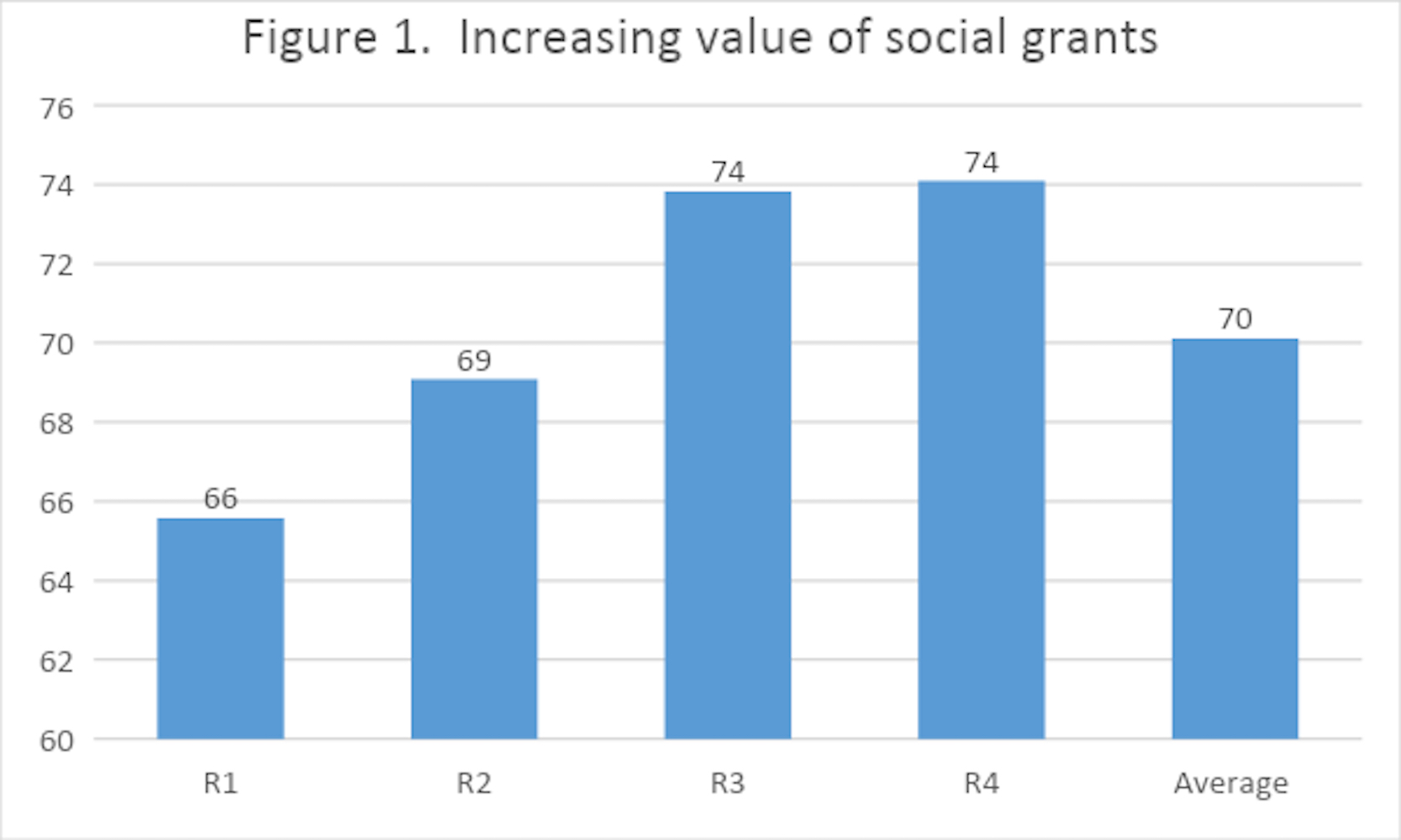
Breaking down these figures further demonstrates that, while there are some variations in who supports grant top-ups, it is an intervention supported by the majority. Women support top-ups slightly more than men, with an average of 74% over all four rounds of the survey compared with 67% of men. Coloured and Indian/Asian adults have the highest level of support for grant top-ups (79%), compared with 69% of black African adults and 67% of white adults.
Poverty and income play some role in influencing views. Those earning R5,000 a month and less are more strongly in favour of grant top-ups – about three-quarters. However, even those who earn more than R5,000 a month and those who define themselves as not poor show strong support for social grant top-ups, with nearly two-thirds supporting them. This illustrates that support for these interventions is supported by those who are unlikely to directly benefit from them, signifying that there is a social consensus on the need to do more to alleviate poverty.
Political loyalties seem to have little effect on backing for grant top-ups. On average, over the four rounds of the survey, supporters of the ANC showed the highest level of support (75%), but top-ups are also backed by EFF and DA voters (73% and 69% respectively).
Social Relief of Distress grant
Like the grant top-ups, the SRD grant is an intervention with widespread backing (see Figure 2). In Round two (3 July to 8 September 2020) and round three (29 December 2020 to 6 January 2021), it was by 69% and 63%, respectively. In round four, support for bringing the grant back was at 64%.
While patterns of support for the SRD grant are largely the same as those supporting grant top-ups, we did find some differences in who favours these interventions. Noticeably, compared with support for grant top-ups, income and employment played a greater role in shaping levels of support. About 70% of those earning less than R1,000 per month were in support of the SRD grant compared with 53% of those earning R10,000 per month or more. While the latter’s level of support is lower, it nevertheless represents just more than half of higher-income earners.
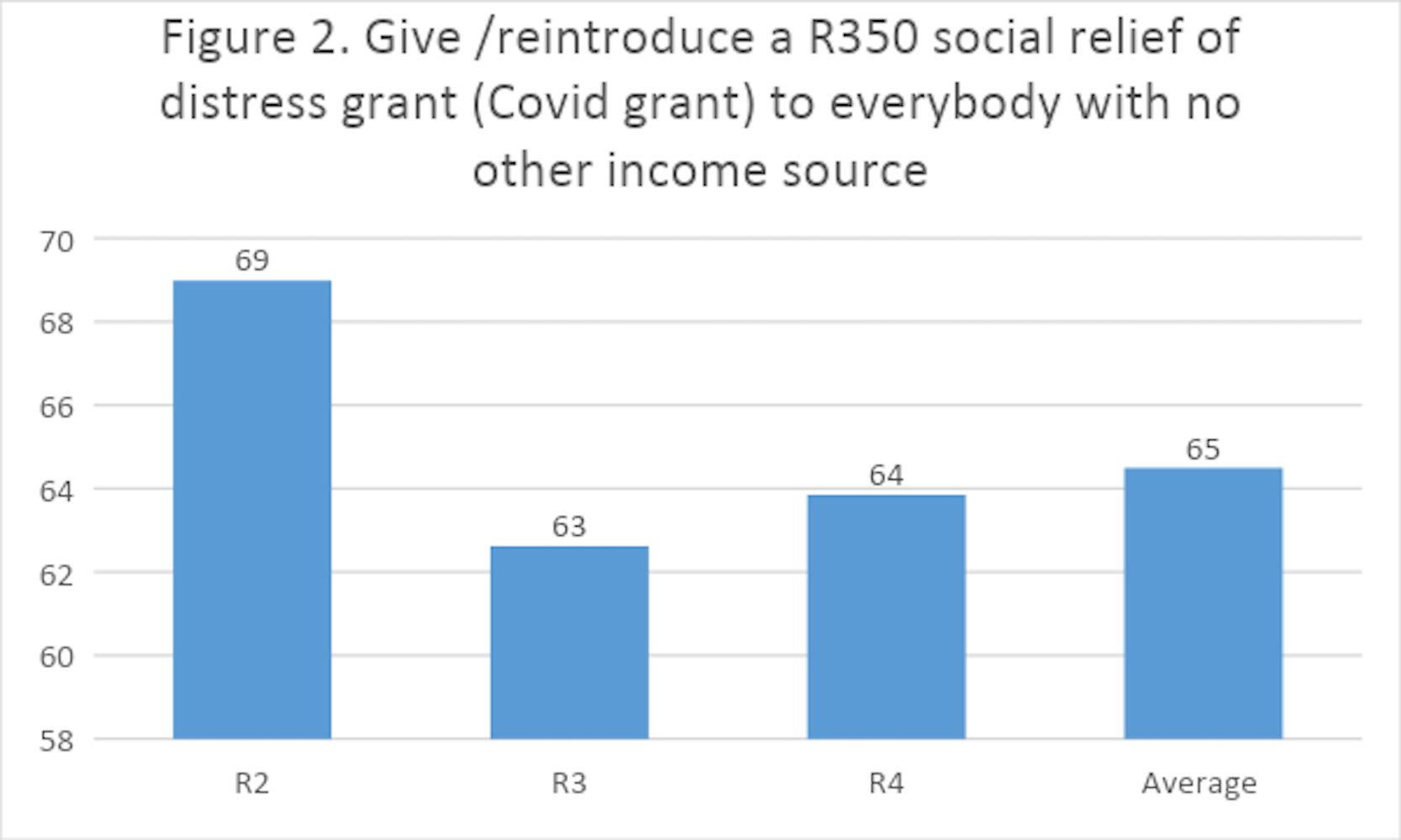
Significantly, support for the SRD grant is highest among the unemployed who are currently looking for work (70%). This is perhaps unsurprising as supporters of the grant have highlighted the role the grant plays in providing resources for transport and data that can help job seekers. Backing for the grant is somewhat lower among those who are full-time or part-time employed (55% and 54% respectively). While this is lower than the unemployed, it still represents a majority of those in some form of employment.
Basic income grant
While the other two policy options asked people to reflect on their support for interventions that were, or had been, in place, asking them to indicate their support for a BIG requires them to contemplate a future initiative. However, previous surveys have shown that the notion of a basic income grant is widely understood, at least on a rudimentary level. As Figure 3 demonstrates, support for the grant has fluctuated over time.
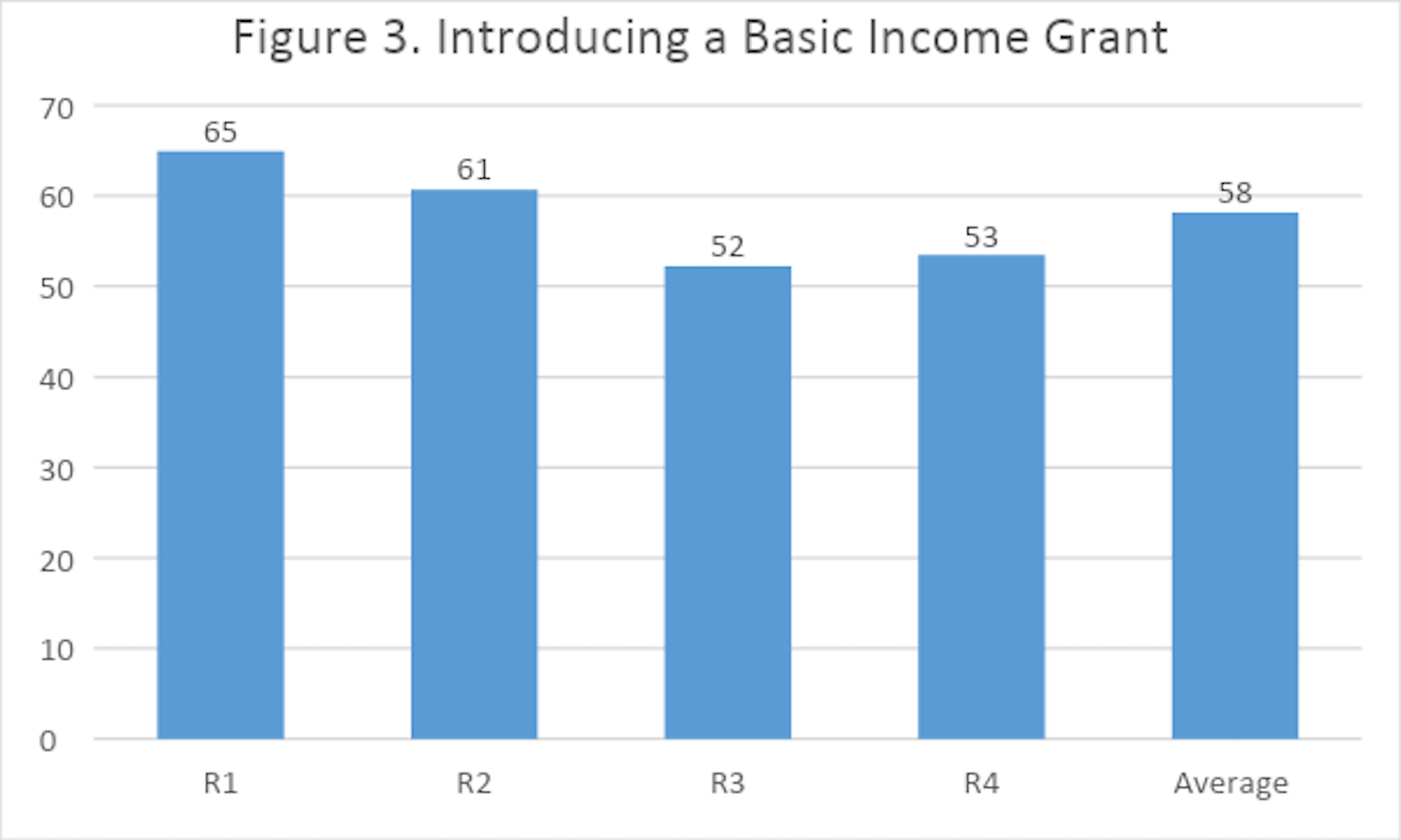
The highest level of support was found during round one, under the conditions of lockdown levels 5 and 4 and before the implementation of social grant top-ups and the SRD grant. Support was slightly lower in round two. A more considerable change occurred between rounds two and three, with support declining from 61% to 52%. Between rounds three and four the support was largely unchanged.
Even when the levels of lockdown declined and the situation gradually “normalised”, the BIG retained support from more than half the adult population. Indeed, as Figure 3 shows, support across all four rounds since April 2020 has averaged 58% (and we should remember that the remaining 42% included “don’t knows” as well as people opposed).
Analysis of the data illustrates some interesting patterns in support for a BIG. On average, across all four rounds it is most strongly backed by Indian/Asian adults (75%), followed by coloured adults (70%) and white adults (60%). The lowest level of support was found among black African adults (55%). Those who had experienced hunger more strongly were more supportive of a BIG than those who had not – 65% compared with 54%.
Interestingly, DA supporters had the highest levels of support for a BIG (62%), compared with 57% of EFF supporters and 51% of ANC supporters.
What do the public want?
While there are variations in support, there is strong evidence that the public want policy interventions that will alleviate poverty and inequality. An analysis of 1,000 messages that survey participants wanted sent to the President demonstrated that the two most prominent concerns were about grants (19%) and jobs and the economy (19%). These messages included:
“Hi Mr President Ramaphosa my question to you is would please make the Social Relief of Distress Grant permanent as the unemployment rate is high in our country I go out every Monday morning searching for a job but no jobs as the Covid-19 pandemic made business bankrupt and a lot of people lost their jobs please help to make the SRD Grant permanent Mr President” (coloured man, 30-34 years, Eastern Cape).
“lyf it’s so hard can he bring back the 350 it was small BT at least it made a very big impact in our lives please president” (black African woman, 35-39 years, Northern Cape).
“Mr president in my house we have a lot of over 18 and unemployed. aleast please Mr president just bring back the 350. it was getting us along.we are educated but, no jobs we are stuck in our parent home with no food. we are more scared of dying from poverty than covid” (black African woman, 30-34 years, Western Cape).
“Bring back the R350 social grants it helped a lot of people... so without them people now go outside and hustle and it would be easier for them to get infected” (black African man, 25-29 years, Gauteng).
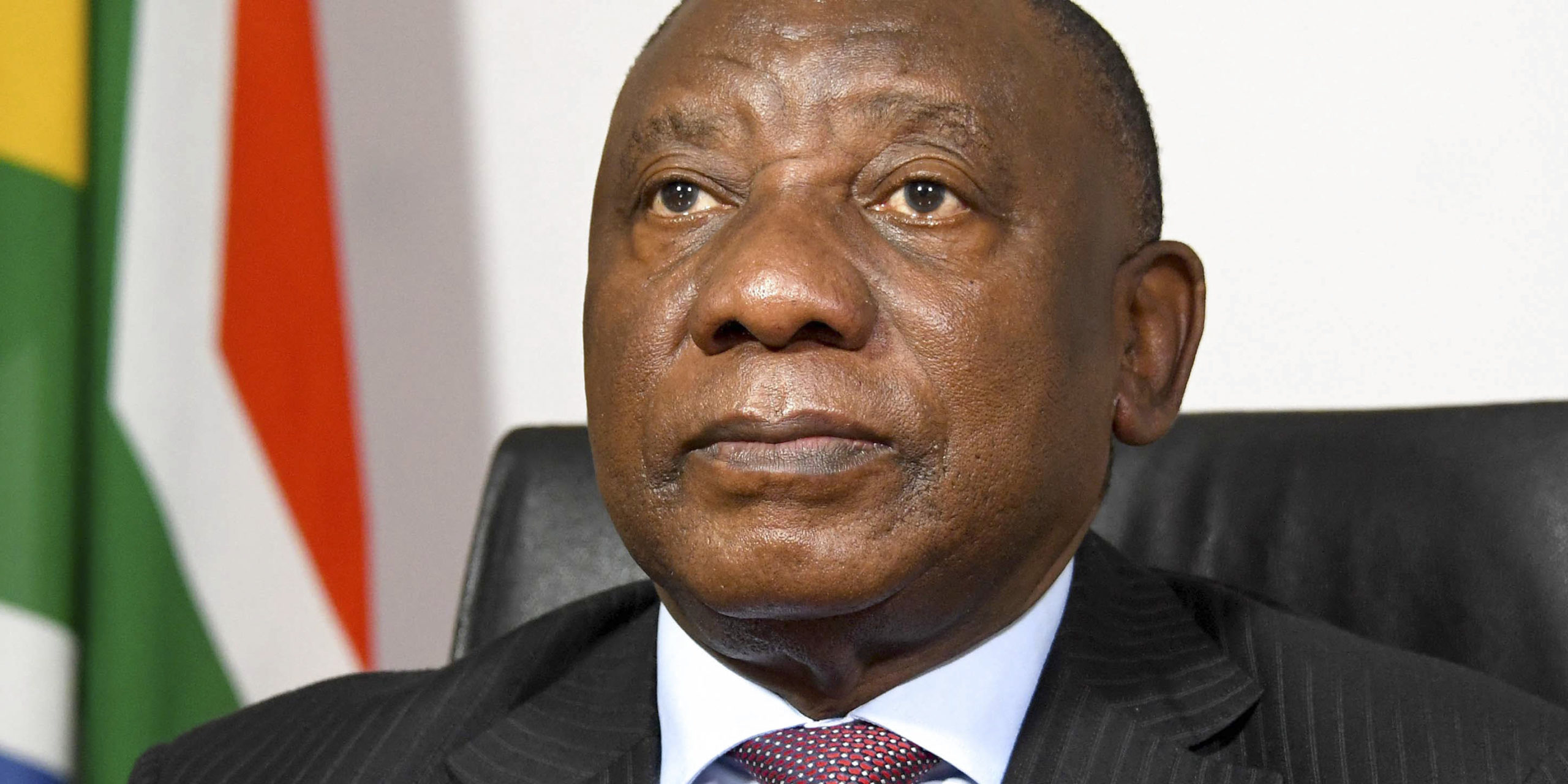 An analysis of 1,000 messages sent to President Cyril Ramaphosa demonstrated that the two most prominent concerns were about grants (19%) and jobs and the economy (19%).
An analysis of 1,000 messages sent to President Cyril Ramaphosa demonstrated that the two most prominent concerns were about grants (19%) and jobs and the economy (19%).
(Photo: Elmond Jiyane, GCIS)
These are appeals from ordinary South Africans to the government to provide social and economic relief. Requests for support are especially noticeable among those with a low income, who are unemployed and looking for work, and those experiencing hunger.
To cushion the devastating impact of Covid-19, particularly on vulnerable groups, the government must ensure that at least the basic needs of people are addressed. Short-term relief, such as the reintroduction of the SRD grant, are welcome to alleviate the devastating impact of the pandemic. But more is needed. A BIG would go some way to addressing poverty and building a more socially just society. DM/MC




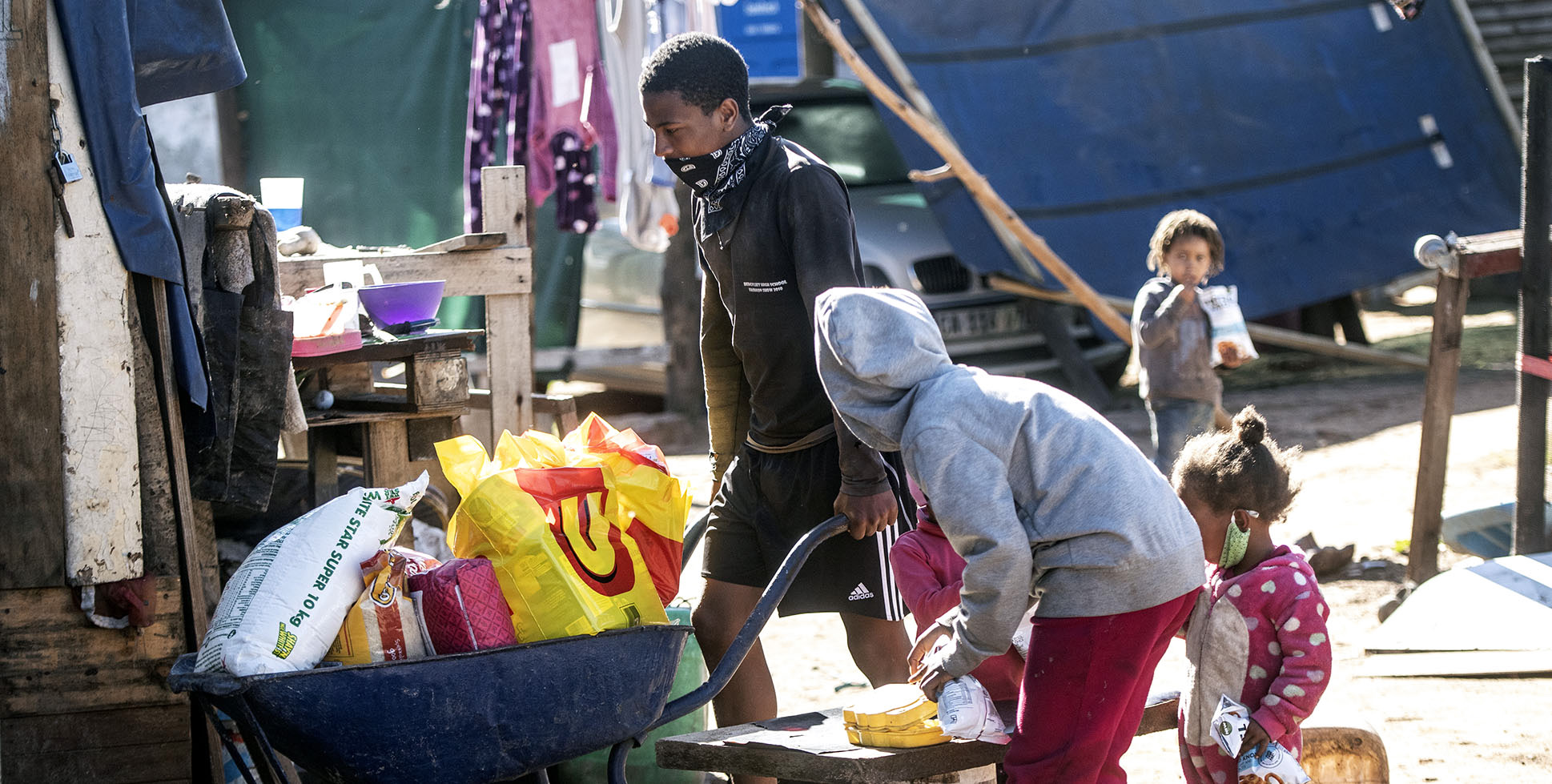 President Cyril Ramaphosa has announced the reintroduction of the Social Relief of Distress (SRD) grant and has indicated that government is considering introduction of a basic income grant (BIG).
(Photo: Elmond Jiyane, GCIS)
President Cyril Ramaphosa has announced the reintroduction of the Social Relief of Distress (SRD) grant and has indicated that government is considering introduction of a basic income grant (BIG).
(Photo: Elmond Jiyane, GCIS)